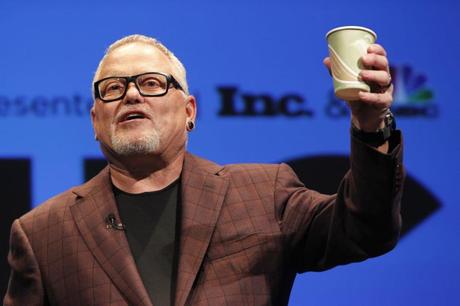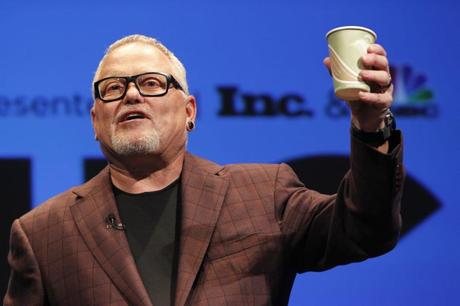In 2018, GoDaddy founder Bob Parsons sat down with two self-styled shamans in Hawaii, one of whom had brewed a small pot of psilocybin tea. There were three cups in the pot, enough for three people, but Parsons felt indulgent. He drank the entire vessel, down to the drop. Then he ate the tea bags.
"I was sailing," says the billionaire.
Psychedelics have become a clichéd pastime for the ultra-rich, with Elon Musk and Google founder Sergey Brin reportedly among the devotees.
"I wonder... if you realize that you have everything you want, but still have the vulnerabilities of being human and will eventually die, maybe the psychedelic experience can fill that gap," says Jerrold Rosenbaum, director from the center. for the Neuroscience of Psychedelics at Mass General Hospital.
But Parsons isn't just a bored rich man licking toads. Until his four-day psychedelic whirlwind, he suffered from crippling post-traumatic stress, which he attributes to a rough childhood and the horrors he experienced in Vietnam.
"I grew up in East Baltimore, mean streets, mean streets," he told an Arizona state legislative panel this week. "[The] The man across the street was beaten to death. They found him and his teeth in different parts of the house."
In two interviews with The Daily Beast, Parsons, 73, elaborated on the turbulent life that led him to natural medicine. As a child he was the victim of an armed robbery. At the age of 17, he enlisted in the Marine Corps along with two of his friends; one of them was stabbed to death before he could be deployed, the other lost three of his limbs in the battle. Parsons himself was evacuated from the war after setting off a trip wire and disemboweling his legs and left elbow.
He says psychedelics helped him cope with the trauma. Now he is funding more research into the drugs. Last year, the Bob & Renee Parsons Foundation donated $6 million to the University of California, Berkeley. The couple has distributed millions more to Mount Sinai Health System and the Bronx VA, among others. In Arizona, Parsons is trying to legalize psychedelic therapy centers.
The story continues
Rosenbaum praised Parsons' commitment to funding scientific research, although he cautioned that psychedelics are not a panacea. "Even under the conditions we studied, not everyone gets better," he said. "We don't know how long it lasts, how to maintain it or how often to do it."
Rosenbaum emphasized that patients should be screened for family histories of bipolar disorder, psychosis and other mental illnesses. "I would be a little concerned about people who really need more extensive care," he said.
Convinced of the benefits, Parsons has become a champion of the drugs. After his experience in 2018, he finally gave up decades of suppressed pain. "It was over," he says, pausing for a moment. "It was over."
Below, Parsons shares more details about his work. The conversation has been edited for length and clarity.
The Daily Beast: I'm curious about the environment in which you grew up. Can you tell me a little more about your childhood?
Parsons: I grew up in East Baltimore. My parents were both gamblers, but not very good at it, so my family was always broke. I mean, totally bankrupt. My mother had an untreated nervous breakdown when I was about 8 years old. And when I was eight, my father transferred me to Catholic school for some reason, and not because he went to church. The nuns there were all crazy. They were quite cruel with their punishment and their treatment.
In seventh grade I was transferred back to public school, and then to high school. And I was a terrible student. In senior year I didn't think I would graduate. I joined the Marine Corps with two friends, and I came back and showed my teachers my orders, and they all passed me. Above all, I would say, it was a pitiful pass.
The Daily Beast: Tell me about your experiences after being deployed.
Parsons: I served in a Marine Corps rifle company during the Vietnam War. And when I left there, I was a pretty happy guy, and, you know, pretty sociable and so on. And then I saw fighting. And when I came back, I was a different man. I mean, I had PTSD covering the band. The man who came back had a short temper and was very intense, and didn't smile much.
My experience also had positive effects. It helped me focus. I continued my work to block out the PTSD, and I was able to accomplish what I did with literally nothing.


The Daily Beast: How has PTSD affected your personal life?
Parsons: Without a doubt, PTSD has cost me two marriages. I mean, both of those ex-wives were good wives and good partners, and they held on as long as they could. And then I got the boot. And then my third wife, Renee, stuck with it and really tried to work with me. And I read this book called How to change your mind, by Michael Pollan, about what psychedelics can do and how they work and how healing they can be. And the book looked like a flashlight shining in a dark room.
So Renee put me in touch with two guides who travel under the radar and help people, especially veterans with PTSD. So I worked with them for the better part of a week, taking three different psychedelics. There were a lot of tears. I mean, when you're dealing with everything, it all comes back. And I mean, it's hard.
The Daily Beast: Can you explain to me the experience of using the medications? What does it feel like when they start working, and where does your brain go?
Parsons: You sit there with your guide and you take the medicine. Probably about 40 minutes to an hour later it starts to take hold and you can feel a buzz and warmth and see things. For example, I walked into what I thought was an ordinary water closet, with only a white dresser and a cabinet that was painted completely white on the inside. When I went in there, it was the most ornate and beautiful thing there was.
The Daily Beast: Did the psychedelics bring back specific memories?
Parsons: One of the memories I had forgotten because I had blocked it out was from the last few months of my deployment. I was doing troop processing in Okinawa, putting guys on flights to come home and verify their units on the way to Vietnam. And when I looked at these guys, I knew they were all going to units that had the toughest fights. I knew many of them would be cut to pieces, and none of them would make it home the way they arrived. The mushrooms showed that I was having terrible problems with them. I mean, I was back there. I could see them. And I cried. I cried as hard as I can ever remember. But now I can talk about it.
How psychedelic hype is hurting more people than we realize
The Daily Beast: How else have the medications changed you?
Parsons: After I finished, people couldn't believe the change in me. My son said to his wife, "You know, Dad keeps calling and he's just so nice and so happy. I think he's found out he's going to die soon. Anyway, when I started using psychedelics, it was 49 years ago that the war broke out. And I finally came home.
The Daily Beast: Would you say that after that experience you felt like a new person, or that you finally felt like yourself again?
Parsons: I would say both. Since there are some issues, I think the psychedelics have helped correct the issues I always had. You know, like so many of us, I grew up tough, and I transferred all of that to the Marine Corps. So when I joined the Marine Corps, I was probably halfway through PTSD, and the war did the rest.
The Daily Beast: Were the psychedelics a one-time cleanse for your brain? Or are they something you will continue to use for ongoing treatment?
Parsons: I experienced it again with two guys from my team. One was a machine gunner and one was the squad leader. And you know what, I'm happy to say that I went ahead and brought them both home.
The Daily Beast: Tell me about the bill to legalize therapy centers in Arizona. Are you optimistic that it will pass?
Parsons: I feel just like Dorothy The Wizard of Oz. There are many different personalities involved when it comes to government. Do I think it will go away? Yes, but that's more hope than knowing.
The Daily Beast: Maybe this is stereotypical, but I suspect Arizona is more conservative about this kind of thing. Has that been your experience?
Parsons: It could be. But marijuana was approved for therapeutic use and five years later it was opened to recreational use. Arizona is a bit more liberal about that kind of thing than you might think.
The Daily Beast: You write a book, Fire in the hole! Can you explain that title?
Parsons: I'm a descendant of miners, and they use that term when they send an attack to loosen some rock. And if I was in the Marine Corps and we found an enemy tunnel, we would never go in. We'd just set up a charge and throw in some plastic explosives. If you look at the rest of my life, how it happened, how it came about, that term just works.
Read more at The Daily Beast.
Get the Daily Beast's biggest scoops and scandals delivered straight to your inbox. Register now.
Stay informed and get unlimited access to the Daily Beast's unparalleled reporting. Subscribe now.
